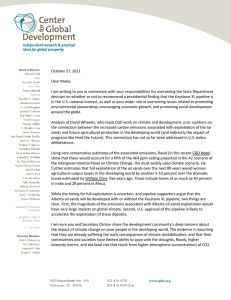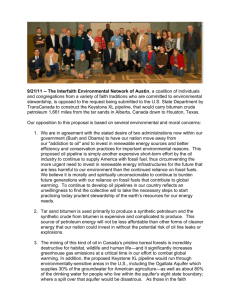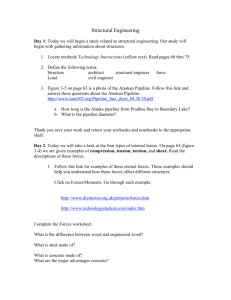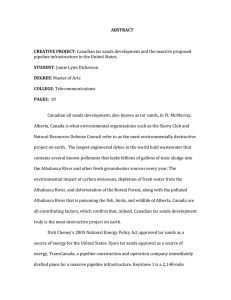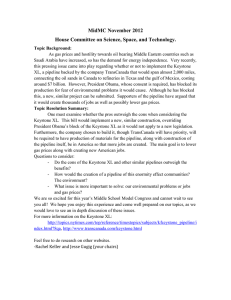Resolution - National Congress of American Indians
advertisement
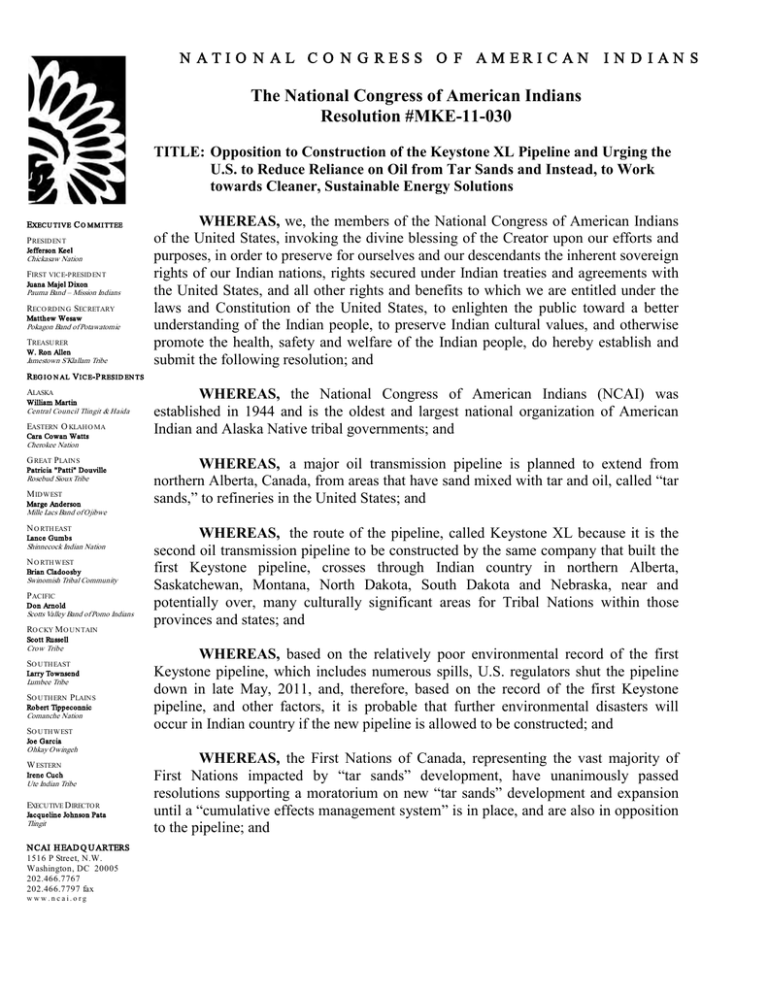
N ATI O N A L C O N G RESS O F AM ERI C AN IN D IAN S The National Congress of American Indians Resolution #MKE-11-030 TITLE: Opposition to Construction of the Keystone XL Pipeline and Urging the U.S. to Reduce Reliance on Oil from Tar Sands and Instead, to Work towards Cleaner, Sustainable Energy Solutions EXEC U TI VE C O M M I TTEE P RESID EN T Jefferson Keel Chickasaw Nation FIRST VICE-PRESID EN T Juana Majel Dixon Pauma Band – Mission Indians RECO RD IN G SECRETARY Matthew Wesaw Pokagon Band of Potawatomie TREASU RER W. Ron Allen Jamestown S’Klallam Tribe WHEREAS, we, the members of the National Congress of American Indians of the United States, invoking the divine blessing of the Creator upon our efforts and purposes, in order to preserve for ourselves and our descendants the inherent sovereign rights of our Indian nations, rights secured under Indian treaties and agreements with the United States, and all other rights and benefits to which we are entitled under the laws and Constitution of the United States, to enlighten the public toward a better understanding of the Indian people, to preserve Indian cultural values, and otherwise promote the health, safety and welfare of the Indian people, do hereby establish and submit the following resolution; and R EG I O N AL V I C E-P RESI D EN TS ALASKA William Martin Central Council Tlingit & Haida EASTERN O KLAH O MA Cara Cowan Watts WHEREAS, the National Congress of American Indians (NCAI) was established in 1944 and is the oldest and largest national organization of American Indian and Alaska Native tribal governments; and Cherokee Nation G REAT P LAIN S Patricia "Patti" Douville Rosebud Sioux Tribe M ID WEST Marge Anderson WHEREAS, a major oil transmission pipeline is planned to extend from northern Alberta, Canada, from areas that have sand mixed with tar and oil, called “tar sands,” to refineries in the United States; and Mille Lacs Band of Ojibwe N O RTH EAST Lance Gumbs Shinnecock Indian Nation N O RTH WEST Brian Cladoosby Swinomish Tribal Community P ACIFIC Don Arnold Scotts Valley Band of Pomo Indians RO CKY M O U N TAIN WHEREAS, the route of the pipeline, called Keystone XL because it is the second oil transmission pipeline to be constructed by the same company that built the first Keystone pipeline, crosses through Indian country in northern Alberta, Saskatchewan, Montana, North Dakota, South Dakota and Nebraska, near and potentially over, many culturally significant areas for Tribal Nations within those provinces and states; and Scott Russell Crow Tribe SO U TH EAST Larry Townsend Lumbee Tribe SO U TH ERN P LAIN S Robert Tippeconnic Comanche Nation SO U TH WEST WHEREAS, based on the relatively poor environmental record of the first Keystone pipeline, which includes numerous spills, U.S. regulators shut the pipeline down in late May, 2011, and, therefore, based on the record of the first Keystone pipeline, and other factors, it is probable that further environmental disasters will occur in Indian country if the new pipeline is allowed to be constructed; and Joe Garcia Ohkay Owingeh W ESTERN Irene Cuch Ute Indian Tribe EXECUTIVE D IRECTO R Jacqueline Johnson Pata Tlingit N CAI H EAD Q U ARTERS 1516 P Street, N.W. Washington, DC 20005 202.466.7767 202.466.7797 fax w w w .n c ai.o rg WHEREAS, the First Nations of Canada, representing the vast majority of First Nations impacted by “tar sands” development, have unanimously passed resolutions supporting a moratorium on new “tar sands” development and expansion until a “cumulative effects management system” is in place, and are also in opposition to the pipeline; and NCAI 2011 Mid-Year Resolution MKE-11-030 WHEREAS, many U.S. Tribal Nations are also in opposition to the Keystone XL pipeline because it would threaten, among other things, water aquifers, water ways, cultural sites, agricultural lands, animal life, public drinking water sources and other resources vital to the peoples of the region in which the pipeline is proposed to be constructed; and WHEREAS, Indian tribes including the Affiliated Tribes of Northwest Indians are also in opposition to the Exxon-Imperial “Heavy Haul” proposal to transport “tar sands” equipment through the Nez Perce Reservation and across scenic highways, and several Indian tribes have joined in litigation to stop this proposal; and WHEREAS, the pipeline is unnecessary as a number of other pipelines are not at full capacity to carry oil from Canada to refineries in the U.S., and the oil is also not likely to end up on the U.S. market but will be exported to foreign countries; and WHEREAS, Tribal Nations and First Nations within Indian country near the route of the proposed pipeline have already stated their opposition to the proposed route of the pipeline, and because of earlier opposition from both Tribes and environmental groups, a supplemental environmental impact statement has been required by the United States Environmental Protection Agency from the proposed operators of the pipeline, a draft of which is now available for public comment; and WHEREAS, since the pipeline is designed to cross the U.S.-Canadian border, the United States Department of State is the lead U.S. agency in evaluating whether the pipeline should be allowed to be constructed in the U.S.; and WHEREAS, the First Nations of Canada and Tribal Nations within the U.S. have a long history of working to ensure protection of their environment, and the Keystone XL pipeline poses grave dangers if it is constructed. NOW THEREFORE BE IT RESOLVED, that the NCAI does hereby oppose the Keystone XL pipeline and the Exxon-Imperial Heavy Haul proposal and their negative impacts on cultural sites and the environment in those portions of Indian country over and through which it is proposed to be constructed, and agrees to file comments regarding this opposition to the Keystone XL pipeline with the Secretary of State as soon as possible; and BE IT FURTHER RESOLVED, that the NCAI hereby urges all affected Tribal Nations to submit comments to the U.S. Department of State regarding the Keystone XL project; and BE IT FURTHER RESOLVED, that the NCAI hereby expresses its solidarity with Canadian First Nations in their efforts to protect their communities, aboriginal land and treaty rights, and their request for a moratorium and better management practices on expanded “tar sands” development and opposition to the Keystone XL pipeline; and BE IT FURTHER RESOLVED, that the United States is urged to reduce its reliance on the world’s dirtiest and most environmentally destructive form of oil – the “tar sands” – that threatens Indian country in both Canada and the United States and the way of life of thousands of citizens of First Nations in Canada and American Indians in the U.S., and requests the U.S. government to take aggressive measures to work towards sustainable energy solutions that include clean alternative energy and improving energy efficiency; and Page 2 of 3 NCAI 2011 Mid-Year Resolution MKE-11-030 BE IT FINALLY RESOLVED, that this resolution shall be the policy of NCAI until it is withdrawn or modified by subsequent resolution. CERTIFICATION The foregoing resolution was adopted by the General Assembly at the 2011 Mid-Year Session of the National Congress of American Indians, held at the Frontier Airlines Center in Milwaukee, WI on June 13-16, 2011, with a quorum present. President ATTEST: Recording Secretary Page 3 of 3
